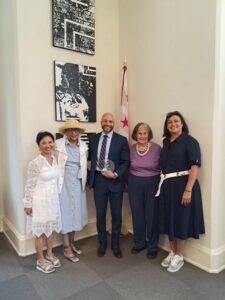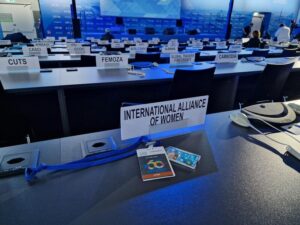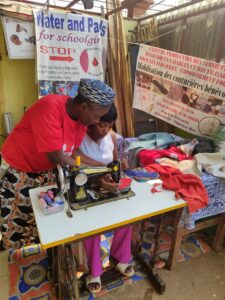Today, a day after the anniversary of the Universal Declaration on Human Rights, adopted here in Paris on December 10, 1948, civil society is highly disappointed that references to the protection of rights, equality and ecosystems have been removed from the core of the climate agreement. Throughout the negotiations, civil society has been and remains united in our call for human rights, the rights of Indigenous peoples, gender equality and the full and equal participation of women, a just transition of the workforce that creates decent work and quality jobs, food security, intergenerational equity, and integrity of ecosystems to ALL be included in Article 2 of the Paris Agreement.
Civil society organizations around the world expect the Paris Agreement to reflect a fair and ambitious deal, reflecting the rights and needs of all individuals and peoples in addressing this climate crisis. It is highly disappointing that in the birthplace of human rights, the French Presidency of the COP21 process would release this draft. President Hollande declared that COP21 would be a ‘new step for human rights’. The French Presidency is hiding behind its ‘neutrality’, claiming that they are not allowed to take any clear position. But there is no neutrality concerning the duty of States to respect and protect our rights and the environment. Either a state chooses to uphold that duty or not. Civil society is doubting this commitment and is deeply concerned by the current draft’s failure to adequately enshrine a fundamental human rights approach in the Paris Agreement.
As recently as this week, Article 2.2 of the draft agreement included strong language on human rights and gender equality, and previous versions included all of the seven essential elements. Despite the urging of many Parties to ensure these cross-cutting principles are reflected not only in the Preamble, but also in the operative part of the Paris Agreement which applies to the entire agreement, they are still missing. The French Presidency and Parties must take a strong stand for inclusion of these rights in Article 2.
We support the strong leadership of the Government of Mexico on this issue, who has drafted the attached letter and formed a “Friends of Principles” group made up of key champions of rights and equality. Now is the time for countries to stand up, to speak up, to defend individuals, peoples, and ecosystems as central to this historic agreement.
We came here for a deal that would protect people and the planet. This is the moment to set the right path, and build on precedent already set within the UNFCCC, to not only signal recognition in the Preamble to the agreement, but also operationalize it in Article 2 of the Agreement.
A handful of reluctant countries cannot be allowed to silence human rights or diminish the weight of their importance in climate change, including the rights of Indigenous peoples, gender equality and the full and equal participation of women, a just transition of the workforce that creates decent work and quality jobs, food security, intergenerational equity, and ecosystems integrity.
We call on the French Presidency and all Parties of COP21 to show true leadership, by ensuring that these essential elements are restored at the core of this Agreement.




